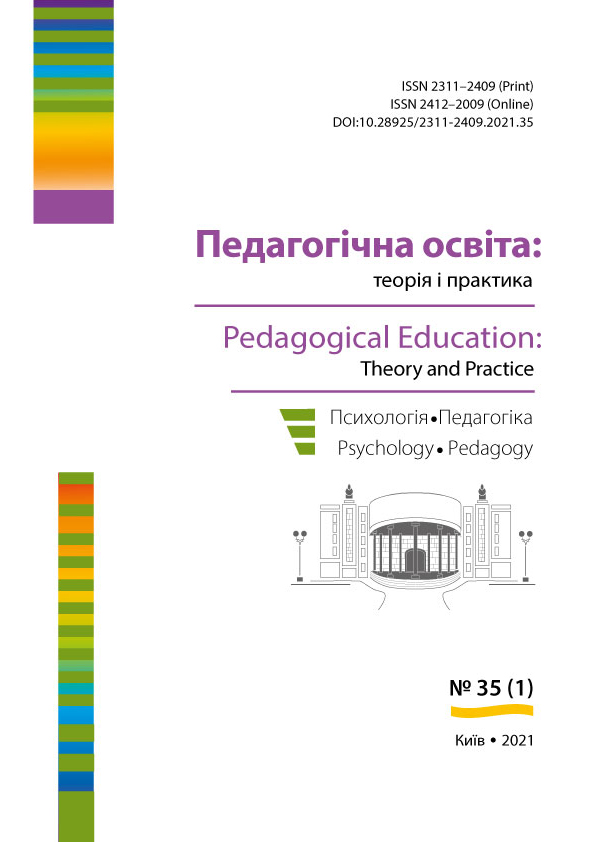PREPARATION OF FUTURE TEACHERS FOR USING MEDIA SPACE IN THE EDUCATIONAL PROCESS OF PRESCHOOL EDUCATION INSTITUTION
DOI:
https://doi.org/10.28925/2311-2409.2021.3512Abstract
The study identifies the relevance of effective professional training of future teachers in the field of preschool education, in particular, the preparation for using media space in the educational process of preschool education institution. The content of one of the main concepts of the study — “media space”, which is defined by us as the space of a set of individual, collective entities, social institutions in the production, existence, circulation of audiovisual (electronic) information, is clarified. Modern media space includes television (terrestrial, cable, satellite, etc.), radio, printed media, movies and videos, DVDs, CD-ROMs, e-mail, computer channels and the Internet. The content of the basic concept of the study “readiness of teachers for using the media space in the educational process of preschool education institution”, which we consider as a holistic integrative, rather embedded in content personality quality, which is a set of values, motives, knowledge, skills, personal professional qualities that determine the effectiveness of the use of media space in the educational process of preschool education institution. The peculiarities of the organization of media space in the conditions of preschool education institution are outlined. On the basis of the analysis of curricula and work programs of educational disciplines of a number of Ukrainian universities, the state of formation of researched readiness of future teachers in the field of preschool education in the conditions of university pedagogical training is investigated. Based on the analysis of the educational activities of teachers of preschool education, the features of their readiness regarding the use of media space in the educational process of preschool education have been studied. The need for further improvement of the educational process to form the readiness of future teachers to use the media space in the educational process of preschool education institution and optimize their independent activities in order to effectively develop the studied professional quality.
Downloads
References
Грицай С.В. Зміст і структурні складові поняття «медіа-діяльність». Освіта регіону. 2012. № 1. URL: http://www. social-science.com.ua (дата звернення: 20.02.2021).
Запорожець Т.М. Медійний простір як середовище зародження інфолюдини. URL: http://ippo. org.ua/ index.php?option=com_content&task=view&id=2180&temid=41 (дата звернення: 20.02.2021).
Карпова Л.Г. Суть поняття «середовище». Педагогіка формування творчої особистості у вищій і загальноосвітній школі. 2011. Вип. 16. С. 109–117. URL: http://www.nbuv.gov.ua/ portal/soc_gum/ pfto/2011_16/files/P1611_17.pdf (дата звернення: 20.02.2021).
Кузьмин А.М. Категория «медиасреда» и ее содержание на современном этапе развития об- щества. Медиаскоп: эл. науч. журн. 2011. № 1. URL: http://mediascope.ru/node/765 (дата звернення: 20.02.2021).
Петрунько О.В. Діти і медіа: соціалізація в агресивному медіасередовищі: моногр. 2-ге вид. Ніжин: Аспект-Поліграф, 2011. 480 с.
Kellner D., Share J. Critical Media Literacy, Democracy, and the Reconstruction of Education. D. Macedo,
S.R. Steinberg eds. Media Literacy. New York: Peter Lang Publishing. 2007. P. 3–23.
Masterman L. A Rational for Media Education. Kubey R. eds. Media Literacy in the Information Age.
New Brunswick (USA) and London (UK). Transaction Publishers. 1997. P. 41–49.
Palamar S., Vaskivska H., Nazarenko L., Nezhyva L., Korniienko I., Terekhov S. Psychocultural Training of Senior Pupils to Adequely Perceive the Media Space Challenges. Wiadomości Lekarskie. Vol. LXXIII, ISSUE 11, November 2020. P. 2515–2523.
Stults, Robert. Media Space, After 20 Years. Computer Supported Cooperative Work. Woodstock, 2009. P. 233–259
REFERENCES
Hrytsai, S. V. (2012). Zmist i strukturni skladovi poniattia “media-diialnist” [The Content and the Structural Components of the Concept of “Media Activity”]. Osvita rehionu, № 1 [in Ukrainian]. http://www. social-science.com.ua
Zaporozhets, T. M. Mediinyi prostir yak seredovyshche zarodzhennia infoliudyny [Media Sspace as an Environment for the Origin of the Info Human] [in Ukrainian]. http://ippo.org.ua/index.php?option=com_content&task=view&id=2180&temid=41
Karpova, L. H. (2011). Sut poniattia “seredovyshche” [The Essence of the Concept of “environment”]. Pedahohika formuvannia tvorchoi osobystosti u vyshchii i zahalnoosvitnii shkoli, Vyp. 16, pp. 109–117 [in Ukrainian].
http://www.nbuv.gov.ua/ portal/soc_gum/pfto/2011_16/files/P1611_17.pdf
Kuzmin, A. M. (2011). Kategoriyia “mediasreda” i yeio soderzhanie na sovremennom etape razvitiia obshchestva [The Category of “media environment” and Its Content at the Present Stage of Development of Society]. Mediaskop: el. nauch. zhurn., № 1 [in Russian].
Petrunko, O. V. (2011). Dity i media: sotsializatsiia v ahresyvnomu mediaseredovyshchi [Children and Media: socialization in an aggressive media environment]. Monohrafiia, 2-he vyd., Nizhyn: Aspekt- Polihraf, 480 [in Ukrainian].
Kellner, D., Share, J. (2007). Critical Media Literacy, Democracy, and the Reconstruction of Education.
D. Macedo, S. R. Steinberg (eds.) Media Literacy, New York: Peter Lang Publishing, pp. 3–23 [in English].
Masterman, L. (1997). Rational for Media Education. Kubey R. (eds.), Media Literacy in the Information Age, New Brunswick (USA) and London (UK). Transaction Publishers, pp. 41–49 [in English].
Palamar S., Vaskivska H., Nazarenko L., Nezhyva L., Korniienko I., Terekhov S. (2020). Psychocultural Training of Senior Pupils to Adequely Perceive the Media Space Challenges. Wiadomości Lekarskie, Vol. LXXIII, ISSUE 11, November 2020, pp. 2515–2523 [in English].
Stults, Robert (2009). Media Space, After 20 Years. Computer Supported Cooperative Work. Woodstock, pp. 233–259 [in English].
Published
Versions
- 2021-06-10 (2)
- 2021-06-10 (1)

